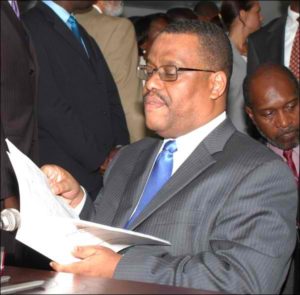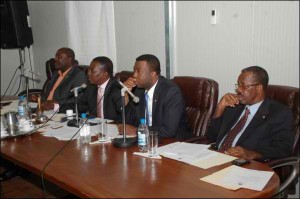
Garry Conille, Prime Minister of Haiti
Facing his first major judicial-political crisis sparked on Thursday Oct. 27 following the unconstitutional arrest and overnight detention of Deputy Arnel Belizaire, Prime Minister Garry Conille created a three-member commission to help uncover the incident’s hierarchical authors and diffuse escalating tensions.
The “Belizaire Affair,” as it is now known, directed the national dialogue for more than two weeks, keeping the population on edge, awaiting a solution to yet another major political crisis. The House of Deputies, on vacation until Jan. 12, 2012, threatened retaliatory measures upon returning to full session to avenge the humiliation the executive inflicted on one of its members. The Senate, meanwhile, tried wriggling free from its own resolution crafted to decapitate President Michel Martelly’s new government. Still, rampant rumors mixed in shades of truths flooded street corners, broadcast and print mediums and the Internet, provoking numerous conspiracy theories and finger-pointing.
“In the democratic context we operate, conflicts are not uncommon,” said Prime Minister Conille during an interview with Marvel Dandin, programming and general director of Radio Kiskeya. “Rather, it is how we resolve matters,” he added. The interview was part of a media tour launched on Monday Nov. 7; community relation efforts Conille said would promote government transparency while improving its relationship with the media. “In me, the press has a strong ally,” he declared to the editing board of Le Matin, a weekly and second oldest Haitian newspaper. Conille’s media strategy sharply contrasted that of President Martelly who branded the highly critical national press the enemy of tourism and development. Conille also announced the creation of an information center to not only facilitate the media’s access to information, but also keep the population informed about government activities.
As Prime Minister Conille answered questions about the political showdown, he attempted to reframe the narrative, calling the crisis a good democratic exercise that had some positive dimensions. He highlighted lengthy senate hearings and government officials’ willingness to answer questions as necessary components of the process. Moreover, Conille suspended police Commissioner Felix Leger pending investigation results from his newly created inquiry commission. “The Committee is completely independent, although it will have to interrogate the prime minister,” assured Israel Jacky Cantave, director of the prime minister’s communications office. “The Commission’s findings will be shared with the assembly of senators before the interpellations procedures scheduled for Nov. 15, 2011,” he said. Refraining from speculations, Conille exhorted patience, emphasizing, he too, awaited the commission’s report and recommendations on legal and administrative mechanism and tools available to prevent further occurrences of such incidents.
Meanwhile, the Senate’s own parallel investigation began Tuesday with a series of hearings, during which, a five-member inquiry commission started questioning 19 people directly involved or with knowledge of the incident. The senate expects the commission’s report by Nov. 15 when it promised to reveal the authors of what they labeled as a kidnapping on the person of Deputy Belizaire and take appropriate measures against them. It is unclear how the conflicting powers will reconcile the reports since Cantave made it clear to reporters there were no links between the two of them. While some senators, namely Moise Charles, saw no problems with the government running its own investigation, he maintained the constitution recognized the legislative branch as the primary regulatory body over the affairs of the state.

Senate's Interpellations session
Political analysts and commentators perceived Conille’s media blitz as an ineffective strategy that would do little to address the immediacy the crisis demanded. They enumerated varying versions of truths already occupying the public sphere, assigning blame and altering perceptions among major obstacles he faced. Nonetheless, the new head of government insisted on fostering cohesiveness, especially within his new team, currently in the cross hairs of legislators. In addition, a released statement from his communications’ office announced a two-day retreat this weekend where team members would search for solutions that addressed the population’s most urgent needs. His governmental retreat, although interfering with the senate’s investigation, aimed at “Reinforcing the cohesion and synergy in government actions that will help facilitate the implementations of various projects under the vision of the Head of State and the promises made by the Prime Minister in his general policy statement,” read the note.
As a result, the senate’s commission postponed government officials’ testimonies it expected to hear this weekend until Monday, including that of the Prime Minister. For his part, Conille expects his two-day retreat to produce a 12-month action plan for the coming year; thus dislodging and dragging the nation’s attention away from the political time bomb and reorienting scarce resources and energy on rebuilding the struggling nation.